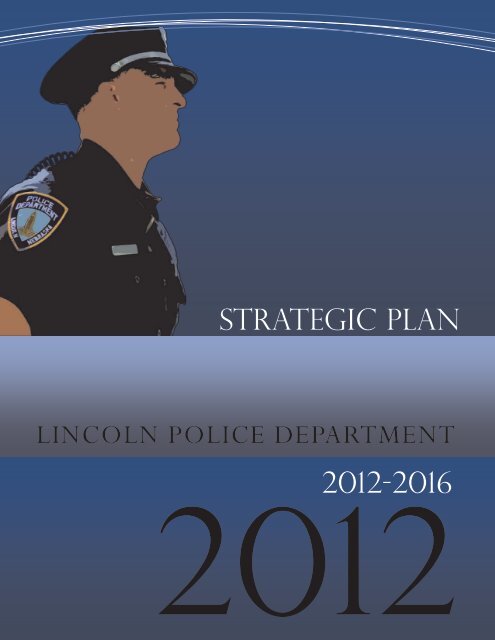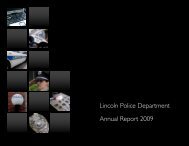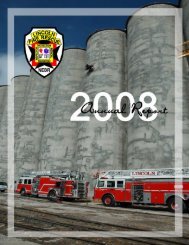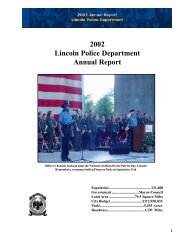Lincoln police department - City of Lincoln & Lancaster County
Lincoln police department - City of Lincoln & Lancaster County
Lincoln police department - City of Lincoln & Lancaster County
Create successful ePaper yourself
Turn your PDF publications into a flip-book with our unique Google optimized e-Paper software.
1<br />
Strategic Plan<br />
LINCOLN POLICE DEPARTMENT<br />
2012-2016<br />
2012
2<br />
Auth orized Sworn Officers 320<br />
Civilian Suppo rt Employe es 1 02<br />
<strong>Lincoln</strong> Population 25 8,37 9<br />
<strong>Lancaster</strong> Coun ty Populatio n 281,531<br />
Annual Bud get $36,1 50,11 9<br />
Table <strong>of</strong> Contents<br />
D E P A R T M E N T S T A T I S T I C S Message from Chief Peschong 3<br />
575 S 10th Street <strong>Lincoln</strong>, Nebraska Telephone 402.441.7204<br />
Mission <strong>of</strong> the <strong>Lincoln</strong> Police Department 4<br />
Introduction 5<br />
Focus Areas 6<br />
Equipment & Technology 7<br />
Pr<strong>of</strong>essional Development 9<br />
Policing 11<br />
Staffing & Facilities 13<br />
W W W . L I N C O L N . N E . G O V / P O L I C E
3<br />
Message Planning from the Process Chief<br />
I am proud to present the <strong>Lincoln</strong> Police Department’s 5 year strategic plan.<br />
This document represents the collaboration and input from a wide variety <strong>of</strong><br />
community, government and employee participants who contributed to the final<br />
product.<br />
I want to thank everyone involved in the development <strong>of</strong> this plan for their<br />
dedication and willingness to help create a strategic plan for the future <strong>of</strong> our<br />
organization.<br />
The <strong>Lincoln</strong> Police Department prides itself in providing our community with innovative solutions and best<br />
practices in the delivery <strong>of</strong> law enforcement services. As a <strong>department</strong> we will continue to build on the<br />
accomplishments <strong>of</strong> our past while providing outstanding service to our community now and in the future.<br />
Two <strong>of</strong> the primary themes <strong>of</strong> this plan are partnerships and collaboration. As an organization we are aware<br />
that improving the quality <strong>of</strong> life in our community will always be a collective effort and one which we will<br />
continue to support.<br />
A strategic plan is a flexible document that will serve as a guide to our future efforts. As we implement this<br />
plan, we will be continuously measuring progress and evaluating outcomes to ensure we are meeting our<br />
goals. This strategic plan is our continuing pledge to provide services through Leadership, Performance and<br />
Dedication.<br />
James Peschong, Chief <strong>of</strong> Police<br />
3
LIFE<br />
We are committed to preserving life<br />
and enhancing the quality <strong>of</strong> life.<br />
EMPOWERMENT<br />
We are committed to an<br />
environment that encourages<br />
problem solving, both by ourselves<br />
and the community.<br />
ACCOUNTABILITY<br />
We are committed to being<br />
responsible for our actions and<br />
taking ownership <strong>of</strong> our work.<br />
DEDICATION<br />
We are committed to our<br />
community, our pr<strong>of</strong>ession<br />
and to each other.<br />
EDUCATION<br />
We are committed to educating<br />
ourselves and our community about<br />
the causes, resolution, and<br />
prevention <strong>of</strong> crime and disorder.<br />
RESPECT<br />
We are committed to human<br />
dignity and the worth <strong>of</strong> all<br />
individuals.<br />
4<br />
Mission, Planning values Process & Goals<br />
“WE, THE MEMBERS OF THE LINCOLN POLICE DEPARTMENT, WORKING<br />
WITH ALL PEOPLE, ARE COMMITTED TO PROVIDING QUALITY POLICE<br />
SERVICES THAT PROMOTE A SAFE AND SECURE COMMUNITY.”<br />
Ensure that all persons may pursue their lawful activities without fear or impediment by<br />
maintaining public order.<br />
Reduce the impact <strong>of</strong> crime, fear <strong>of</strong> crime, and public disorder on the daily lives <strong>of</strong><br />
<strong>Lincoln</strong> residents through patrol, crime prevention, criminal investigation, and law<br />
enforcement.<br />
Respond to calls for service and other public needs promptly in order to provide<br />
services which resolve problems and protect persons and property.<br />
Manage the fiscal, capital, information, and personnel resources <strong>of</strong> the <strong>department</strong> with<br />
efficiency and care.<br />
Develop and maintain open relationships and communications with other agencies,<br />
organizations, and the public at large.<br />
Protect safe and orderly transportation through traffic direction, law enforcement, and<br />
accident investigation.<br />
Recruit and retain the best possible employees, reflecting the diversity <strong>of</strong> our population.<br />
Provide employees with opportunities for meaningful work, challenging goals and growth<br />
throughout their career.<br />
4
5<br />
ORGANIZATIONAL STRUCTURE<br />
The <strong>Lincoln</strong> Police Department is<br />
led by Chief James Peschong. He<br />
was appointed to the position in<br />
2011, during the formulation <strong>of</strong><br />
this plan, when former Chief <strong>of</strong><br />
Police Tom Casady was named<br />
Public Safety Director for the <strong>City</strong><br />
<strong>of</strong> <strong>Lincoln</strong>.<br />
Chief Peschong and Assistant<br />
Chief Brian Jackson oversee the<br />
two divisions <strong>of</strong> the <strong>department</strong>:<br />
operations and support.<br />
The Operations Division consists<br />
<strong>of</strong> five community <strong>police</strong> teams,<br />
each headed by a captain. The<br />
division also includes duty commanders<br />
and the Traffic Enforcement<br />
Unit.<br />
The Support Division is comprised<br />
<strong>of</strong> Criminal Investigations,<br />
Narcotics, Crime Analysis,<br />
Education & Personnel, Victim/<br />
Witness, Property, Records,<br />
Service Desk, Information<br />
Services, Forensics, Police Garage<br />
and Finance. Each <strong>of</strong> these units is<br />
headed by a captain or civilian<br />
manager.<br />
Strategic plan<br />
introduction<br />
The <strong>Lincoln</strong> Police Department is a nationally accredited agency through the Commission<br />
on Accreditation for Law Enforcement Agencies, CALEA. In 1989, LPD was the first<br />
agency in Nebraska to be accredited and the 103 rd in the nation. The <strong>department</strong> has been<br />
re-accredited six times and during the last accreditation cycle was awarded<br />
“Meritorious” (accredited continuously for 15 years) and as a “Flagship Agency” (two<br />
continuous accreditations without corrections.)<br />
With a sworn staff <strong>of</strong> 320 and a civilian staff <strong>of</strong> 102, the <strong>Lincoln</strong> Police Department is<br />
considered a leader in technology and innovative strategies in problem solving. We<br />
have a strong commitment to community policing and intelligence led policing.<br />
Sergeant Don Scheinost and Captain Joy Citta were assigned to create the <strong>department</strong>’s<br />
strategic plan during 2011. Four committees were assembled consisting <strong>of</strong> commissioned,<br />
civilian and government employees along with community members. The committees<br />
met over several months discussing, researching and creating the LPD 2012 strategic<br />
plan.<br />
The Strategic Plan consists <strong>of</strong> four focus areas, Equipment and Technology, Pr<strong>of</strong>essional<br />
Development, Staffing and Facilities and Policing. Once implemented the 2012 Strategic<br />
Plan will serve as the vision for the growth and advancement <strong>of</strong> the <strong>Lincoln</strong> Police<br />
Department.<br />
The next several years will be pivotal to the <strong>City</strong> <strong>of</strong> <strong>Lincoln</strong> and the <strong>Lincoln</strong> Police<br />
Department. A new arena, hotels and roadways will open in the Historic Haymarket<br />
district. The <strong>police</strong> <strong>department</strong> will face a turnover in management as a number <strong>of</strong><br />
command staff reach retirement age and new commanders begin leading the <strong>department</strong>.<br />
Budgets will continue to be closely watched.<br />
This Strategic Plan is a guideline to be used as the vision looking to the future <strong>of</strong> the<br />
<strong>department</strong> and the community we serve.<br />
5
6<br />
The twenty-seven members<br />
<strong>of</strong> the strategic planning<br />
committee were assigned to<br />
four subcommittees. They<br />
met at regular intervals to<br />
discuss critical issues and<br />
form plans for impact.<br />
Each group consisted <strong>of</strong><br />
sworn <strong>of</strong>ficers, civilian<br />
personnel and members <strong>of</strong><br />
the community. Together,<br />
they developed a common<br />
vision and a road map for<br />
the future success <strong>of</strong> the<br />
<strong>Lincoln</strong> Police Department.<br />
They recognized that, in<br />
order for this document to<br />
be meaningful, it needed to<br />
be attainable. True to this<br />
ideal, the elements<br />
contained within this plan<br />
are attainable goals which<br />
will assist the <strong>department</strong> in<br />
charting a course for the<br />
future.<br />
Focus areas<br />
EQUIPMENT & TECHNOLOGY<br />
Captain Michon Morrow, Chair<br />
Tyler Petit, University <strong>of</strong> Nebraska-<strong>Lincoln</strong> Student<br />
Dixie Johnson, Northeast Team Citizen<br />
Nancy Clark, <strong>Lincoln</strong>/<strong>Lancaster</strong> <strong>County</strong> Health Department<br />
Sergeant Todd Beam, <strong>Lincoln</strong> Police<br />
Officer Tracy Graham, <strong>Lincoln</strong> Police<br />
Officer Joe Yindrick, <strong>Lincoln</strong> Police<br />
PROFESSIONAL DEVELOPMENT<br />
Sergeant Danny Reitan, Chair<br />
Jeremy Walther, University <strong>of</strong> Nebraska-<strong>Lincoln</strong> Student<br />
Dr. Linda Becker, Union College<br />
JJ Mayer, Executive Secretary to the Chief <strong>of</strong> Police<br />
Jon Carlson, Mayor’s Aide<br />
Marie Mathine, Crime Analysis Unit<br />
Officer Andrew Ripley, <strong>Lincoln</strong> Police<br />
Officer Andrew Vocasek, <strong>Lincoln</strong> Police<br />
POLICING<br />
Captain Jason Stille, Chair<br />
Joshua Maguire, University <strong>of</strong> Nebraska-<strong>Lincoln</strong> Student<br />
Vicki Lamb, Southwest Team Citizen<br />
Shirley Terry, <strong>Lincoln</strong>/<strong>Lancaster</strong> <strong>County</strong> Health Department<br />
Officer Tarvis Banks, <strong>Lincoln</strong> Police<br />
Sergeant Chad Barrett, <strong>Lincoln</strong> Police<br />
STAFFING & FACILITIES<br />
Sergeant Teresa Hruza, Chair<br />
Lance Johnson, University <strong>of</strong> Nebraska-<strong>Lincoln</strong> Student<br />
Steve Langdon, Community Action Partnership <strong>of</strong> <strong>Lancaster</strong> and Saunders Counties<br />
Rashi Jain, <strong>Lincoln</strong> Planning Department<br />
Pat Wenzl, Police Garage Manager<br />
Captain Jim Davidsaver, <strong>Lincoln</strong> Police<br />
Officer Trevor Schmidt, <strong>Lincoln</strong> Police<br />
6
7<br />
Equipment & technology<br />
The <strong>Lincoln</strong> Police Department strives to be on the<br />
cutting edge with technology use and the ability to<br />
place information in the hands <strong>of</strong> <strong>of</strong>ficers and employees<br />
who use it in their daily work. Benefits to<br />
the community include web based crime mapping<br />
and most <strong>of</strong> the <strong>department</strong>’s public information<br />
available to the public through any computer or<br />
smart phone.<br />
Radio System<br />
The current radio system became operational in<br />
1988 and was upgraded in 1997, but is at its end <strong>of</strong><br />
life. Parts are no longer available leaving the system<br />
in a compromising position should any part <strong>of</strong> the<br />
system fail. This system is used by all the city agencies<br />
but the critical usage is in the safety areas <strong>of</strong> 911,<br />
fire and <strong>police</strong>.<br />
Recommendation: The radio system needs to be<br />
replaced with an 800MHz digital system. Updating<br />
the system will include upgrades to some portable<br />
radios and additional radio tower sites in <strong>Lincoln</strong> and<br />
<strong>Lancaster</strong> <strong>County</strong>. The cost estimate is $15 to $18<br />
million dollars. Due to the current economic budget<br />
climate, replacing the radio system will require a<br />
bond issue. It is paramount to begin the process <strong>of</strong><br />
educating the public on this need in the near future<br />
to obtain a positive result with the bond issue.<br />
SWAT Team<br />
SWAT continues to be activated in a variety <strong>of</strong><br />
critical situations. They must maintain up-to-date<br />
equipment and training.<br />
Recommendation: The SWAT team should have<br />
access to an armored vehicle, upgraded weapons,<br />
audio and video surveillance, monitoring equipment,<br />
radios and recording devices. They should have the<br />
most up-to-date body armor available.<br />
recommendations<br />
Technology assigned to a Person,<br />
not a place<br />
With the trend toward smaller cruisers, two <strong>of</strong>ficer<br />
cruiser assignments and the significant amount <strong>of</strong><br />
information available to <strong>of</strong>ficers, it is relevant to<br />
address the placement <strong>of</strong> technology resources.<br />
Recommendation: We have extensive policing<br />
applications, most notably P3i (Proactive Police<br />
Patrol Information) and on-line reports available for<br />
<strong>of</strong>ficers, but the devices necessary to utilize the<br />
technology are fixed and shared. The mobile data<br />
computers are bulky, creating space and safety issues<br />
for smaller vehicles and two <strong>of</strong>ficer cruisers. They<br />
are also costly to purchase and install. Numerous<br />
smaller devices are currently being tested for the P3i<br />
application. These devices are less costly and are<br />
portable. They can also be mounted in cruisers,<br />
saving space and allowing for the integration <strong>of</strong><br />
Computer Aided Dispatch and P3i to improve <strong>of</strong>ficer<br />
safety, productivity and efficiency. The <strong>department</strong><br />
should also research the ability to purchase and assign<br />
smaller, portable devices to individual <strong>of</strong>ficers.<br />
RISING FUEL PRICES<br />
The cost <strong>of</strong> fuel has continued to increase leaving the<br />
<strong>department</strong> to search for ways to economize on this<br />
necessary product.<br />
Recommendation: Continue purchasing smaller,<br />
fuel efficient cruisers, include technology that allows<br />
the cruiser to fully functions as their <strong>of</strong>fice. The use<br />
<strong>of</strong> air cards in Mobile Data Computers allows <strong>of</strong>ficers<br />
to work from their car as if they were in a station<br />
decreasing the need to travel. Two <strong>of</strong>ficer cruisers,<br />
Global Positioning Satellites and Automatic Vehicle<br />
Locators used by 911 dispatchers will allow<br />
assignment <strong>of</strong> the closest cruiser to a call for service.<br />
Consideration should be given to providing <strong>of</strong>ficers<br />
with their cruiser fuel use reports on a monthly basis.<br />
7
8<br />
Equipment & technology<br />
Digital technology<br />
Advances in technology continue to permeate the<br />
entire <strong>department</strong> from bar coding in Property, on<br />
line reports in records, virtual evidence rooms and<br />
in-car digital cameras.<br />
Recommendation: The technology available<br />
should be integrated into the <strong>department</strong>’s daily<br />
functions. Property should have an electronic<br />
bar coding system, allowing for accurate<br />
documentation <strong>of</strong> chain <strong>of</strong> custody and reduce the<br />
space needed for storage.<br />
Virtual evidence rooms allow other<br />
necessary agencies like city and county attorneys to<br />
view and access evidence, saving employee time<br />
retrieving and copying evidence for court.<br />
In-car digital cameras provide an un-biased account<br />
<strong>of</strong> events as they unfold, increasing <strong>of</strong>ficer safety,<br />
providing evidence for prosecution and limiting<br />
<strong>department</strong> liability. Digital cameras should be<br />
expanded to all cruisers with the ability to cover<br />
several different angles. Wearable cameras carried<br />
by the <strong>of</strong>ficers when they leave the cruiser are also<br />
a highly recommended option. Consideration<br />
should be given to digital storage capacity and<br />
retrieval with policies and procedures in place to<br />
keep evidence secure.<br />
Recommendations<br />
Briefings<br />
The <strong>Lincoln</strong> Police Department conducts over 10<br />
employee briefings a day to <strong>of</strong>f-site locations and<br />
<strong>of</strong>fices. Because <strong>of</strong> varying shifts and assignments the<br />
information presented is repeated for several days<br />
possibly causing some <strong>of</strong> the information to drop <strong>of</strong>f or<br />
new information to be missed.<br />
Recommendation: The <strong>department</strong> needs to review<br />
different formats for acquiring the daily briefing<br />
information determining if there is a better way to<br />
provide quality and timely information.<br />
8
9<br />
Pr<strong>of</strong>essional Development<br />
Pr<strong>of</strong>essional development includes training and<br />
advancement with each having a direct effect on job<br />
satisfaction. Training resources and opportunities to<br />
learn are critical elements in maintaining a high level<br />
<strong>of</strong> service for the community.<br />
All employees <strong>of</strong> the <strong>Lincoln</strong> Police Department,<br />
civilian and commissioned, play a vital role in<br />
meeting our mission. Preparing future leaders by<br />
keeping staff up to date with changing technology<br />
prepares the <strong>department</strong> to move into the future<br />
Our employees are our most valuable assets.<br />
We must continue to invest in their ongoing<br />
development to ensure needs are met on the<br />
individual and <strong>department</strong> level. This investment<br />
provides a rewarding and healthy work environment<br />
which in turn drives our employees to seek excellence.<br />
Overall quality <strong>of</strong> service will begin to deteriorate if<br />
employees spend all <strong>of</strong> their time just accomplishing<br />
their core duties and are not trained to be the next<br />
generation <strong>of</strong> supervisors and leaders.<br />
recommendations<br />
Institutional knowledge<br />
There is a need to preserve and share institutional<br />
knowledge and best practices. When employees leave<br />
after many years <strong>of</strong> service a certain amount <strong>of</strong> expertise<br />
and experience may be lost, especially in some<br />
specialized investigative areas or key positions in the<br />
civilian and commissioned ranks.<br />
Recommendation: Use <strong>of</strong> retired employees as<br />
instructors should be more fully explored. Lateral<br />
entry employees should also be recruited and<br />
considered as resources for new ideas or for<br />
identification <strong>of</strong> other available training options.<br />
Training<br />
Fiscal constraints have affected the ability to participate<br />
in outside training other than specialized<br />
requirements.<br />
Recommendation: Strive to create public/private<br />
partnerships that would facilitate training opportunities.<br />
Examples <strong>of</strong> this partnership could include the<br />
insurance industry for auto theft training, the banking<br />
industry for fraud training and the various universities<br />
for management or personnel development. Cross<br />
training with other agencies for critical incidents and<br />
disasters prepares staff to function effectively during<br />
larger incidents involving multiple entities.<br />
Seek additional funds through grant programs or<br />
partnering with community companies and<br />
organizations to fund training.<br />
Existing union contracts contain clauses for educational<br />
advancement for some civilian and commissioned<br />
employees. A restructuring <strong>of</strong> negotiated language<br />
could make funds available for individual employees to<br />
use.<br />
9
10<br />
Pr<strong>of</strong>essional Development<br />
Training as a “Reward”<br />
Staffing factors, and the perception <strong>of</strong> training being<br />
approved as a ‘reward’ or based on length <strong>of</strong> service,<br />
have curtailed several opportunities for employees to<br />
participate in optional training. This has led to some<br />
frustration on the part <strong>of</strong> employees trying to improve<br />
their performances. Scheduled in-service sessions<br />
also impact pre-existing staffing levels. Time<br />
commitments from outside sources may also limit the<br />
availability to provide new and relevant training to<br />
employees.<br />
Recommendation: Make training available through<br />
web-based computer programs, utilizing resources<br />
such as the Department <strong>of</strong> Homeland Security or<br />
Department <strong>of</strong> Justice programs for training not<br />
readily available locally. An on-line training library<br />
should be developed that can be accessed by all<br />
employees via the internal home page. These<br />
resources would allow employees to have training<br />
available at their fingertips at any time while still<br />
maintaining staffing levels on the street.<br />
Advancement programs<br />
There is little ability for an employee to experience<br />
positions <strong>of</strong> an advanced rank.<br />
Recommendation: Creation <strong>of</strong> detailed Standard<br />
Operating Procedures (SOPs) for critical positions in<br />
the civilian and commissioned ranks is essential for<br />
passing on knowledge from those positions.<br />
Pre or post promotional process programs should be<br />
implemented to assist those seeking advanced<br />
positions. Mentoring or shadowing could be an<br />
important element <strong>of</strong> pr<strong>of</strong>essional development.<br />
An example would include allowing those eligible for<br />
a promotion to spend a period <strong>of</strong> time with<br />
employees already in that position to begin to draw<br />
upon their experience prior to appointment.<br />
Recommendations<br />
Special Assignments<br />
Advancement is not limited to promotion.<br />
Appointment to a specialized position is <strong>of</strong>ten a<br />
career goal for employees.<br />
Recommendation: Temporary special assignments<br />
should continue to be utilized to either provide<br />
additional training or to prepare for appointment to<br />
a specialized position. Specialized positions should<br />
continue to rotate giving employees opportunities in<br />
different areas <strong>of</strong> the <strong>department</strong>.<br />
Other Recommendations: Implement a practice <strong>of</strong><br />
periodic meetings within and between teams or units<br />
to discuss needs, goals, obstacles and opportunities.<br />
These structured meetings provide the opportunity to<br />
<strong>of</strong>fer guidance, gain feedback, and give wider insight<br />
into broader responsibilities. This is an important<br />
foundation for leadership development. Cross training<br />
should be examined as a way to provide an opportunity<br />
for advancement.<br />
10
11<br />
The <strong>Lincoln</strong> Police Department’s ability to deliver<br />
core <strong>police</strong> services through community based<br />
policing is part <strong>of</strong> the on-going partnership we have<br />
with the <strong>Lincoln</strong> community. For over 30 years we<br />
have involved the community in the way <strong>Lincoln</strong> is<br />
<strong>police</strong>d.<br />
Community Based policing<br />
We have continued to refine and implement<br />
additions to our community based policing<br />
philosophy since beginning Team Policing in 1975.<br />
Partnering with community groups and<br />
neighborhood associations has been central to our<br />
organizational goals and become part <strong>of</strong> the culture<br />
<strong>of</strong> the <strong>Lincoln</strong> Police Department.<br />
Recommendation: Maintain the community<br />
policing model established over 30 years ago but<br />
continue to refine our response by including<br />
technology advances, best practices and innovative<br />
ideas. Community Based Policing works for <strong>Lincoln</strong><br />
and we should continue this high level <strong>of</strong> partnership<br />
with the community.<br />
De-Centralized Substations<br />
As the community continues to grow <strong>of</strong>ficers who<br />
start their shift by reporting to the main station have<br />
to travel long distances to reach their assigned areas<br />
and begin answering calls for service. The high costs<br />
<strong>of</strong> fuel and increased travel time to reach outlying<br />
team areas continues to increase response time.<br />
Recommendation: The southeast portion <strong>of</strong> the<br />
city is one <strong>of</strong> the fastest growing areas in square miles<br />
and population. The <strong>department</strong> should plan for a<br />
full service team station in that quadrant <strong>of</strong> the city<br />
and evaluate the need to realign the geographic team<br />
boundaries to evenly distribute <strong>police</strong> resources<br />
based on need. Opportunities to combine this station<br />
with other public safety needs, such as a fire station,<br />
should be explored.<br />
Policing<br />
recommendations<br />
technology<br />
Technology continues to rapidly change the way<br />
we <strong>police</strong> allowing for more efficient policing and<br />
response to the community.<br />
Recommendation: Citizens continue to gather<br />
information and communicate electronically. There<br />
is a need for the 911 call center to accept calls for<br />
service via text message and this method <strong>of</strong> communication<br />
will only increase in the coming years. With<br />
the proliferation <strong>of</strong> smart-phones and recording devices,<br />
there will be an increase in cellular phone photographs,<br />
video surveillance, and cellular phone video<br />
provided as evidence or sent to the <strong>police</strong> <strong>department</strong><br />
at the onset <strong>of</strong> a report. There is a need to enhance<br />
our ability to examine and process this evidence<br />
as the current backlog on cases is only expected<br />
to increase.<br />
The use <strong>of</strong> Global Positioning Satellites that can<br />
monitor the location <strong>of</strong> <strong>police</strong> vehicles and our<br />
portable radios should be explored. This can increase<br />
the safety <strong>of</strong> our <strong>of</strong>ficers and allow dispatch to send<br />
the closest units to a call for service. Potential<br />
benefits include lower response times and reduced<br />
fuel consumption.<br />
11
12<br />
Budget constraints<br />
Government budgets continue to require a close<br />
financial look for cost savings while continuing to<br />
provide quality services that promote a safe and<br />
secure community. Our community continues to list<br />
maintaining quality <strong>police</strong> services as a top priority.<br />
Recommendation: Explore the use <strong>of</strong> two-<strong>of</strong>ficer<br />
response cars as a cost saving option. The test<br />
should evaluate times, number <strong>of</strong> calls for service and<br />
team areas.<br />
Increase the types <strong>of</strong> work and the areas volunteers/<br />
interns can provide services on the <strong>department</strong>.<br />
Recruitment <strong>of</strong> long term skilled volunteers and<br />
interns for specific projects can increase the ability <strong>of</strong><br />
the <strong>department</strong> to move forward without incurring<br />
additional costs.<br />
The <strong>Lincoln</strong> Police Department should also explore<br />
the possibility <strong>of</strong> taking some belated or non-urgent<br />
calls for service over the phone. Examples <strong>of</strong> these<br />
types <strong>of</strong> calls are crimes without suspects, calls for<br />
service without physical evidence and runaways.<br />
Policing<br />
recommendations<br />
12
13<br />
Staffing & Facilities<br />
The <strong>Lincoln</strong> Police Department will need to plan for<br />
future growth as the city continues to increase in size.<br />
As this growth takes place, additional personnel and<br />
<strong>of</strong>f site facilities will need to be developed. The<br />
<strong>police</strong> garage, range and canine facilities are also in<br />
need <strong>of</strong> redevelopment or renovation.<br />
Police Garage and K Street Storage<br />
The <strong>police</strong> garage, built in 1930, at 635 J Street<br />
continues to require costly repairs. The garage<br />
increased it’s workload two years ago when it started<br />
handling maintenance and repairs for most <strong>of</strong> the<br />
city’s small vehicles. Storage at a city owned building<br />
located at 10 th and K Streets utilized by LPD property<br />
is limited with no opportunity for expansion.<br />
Recommendation: A new or remodeled garage<br />
facility in a central location will allow for efficient<br />
servicing <strong>of</strong> <strong>department</strong> and city vehicles. Combining<br />
the garage with additional storage for LPD property<br />
eases the growing storage problem.<br />
De-Centralized Substations<br />
As the city continues to grow in population and<br />
square miles additional decentralized <strong>police</strong> substations<br />
or stand-alone Team Stations will be needed.<br />
De-centralized stations allow the <strong>department</strong> to<br />
continue providing neighborhoods with accessible<br />
<strong>police</strong> services and response times within 10 minutes<br />
to most calls for service<br />
Recommendation: A cooperative effort between<br />
the <strong>Lincoln</strong> Police Department and other agencies<br />
should be examined. The <strong>Lincoln</strong> Police Department<br />
should work with other city agencies to develop<br />
shared decentralized locations throughout the city.<br />
A shared facility would reduce cots.<br />
recommendations<br />
K-9 and Range Facilities<br />
LPD does not have a K-9 training facility for the<br />
weekly training required for the five canines and their<br />
handlers. The long term rental <strong>of</strong> the <strong>police</strong> firing<br />
range will end in the next couple <strong>of</strong> years forcing the<br />
<strong>department</strong> to move to a new location.<br />
Recommendation: The development <strong>of</strong> a <strong>police</strong><br />
firing range is the top facility priority for the<br />
<strong>department</strong>. Combining the location <strong>of</strong> a range,<br />
training classrooms and a training area for the<br />
<strong>department</strong> canines would be ideal. Partnering with<br />
other city or governmental agencies would reduce the<br />
initial building costs to the <strong>department</strong> and potentially<br />
allow for rental use providing additional revenue.<br />
Forensic Lab<br />
The demands <strong>of</strong> the <strong>Lincoln</strong> Police Department’s<br />
Forensic Lab continue to increase.<br />
Recommendation: Better facilities that can handle<br />
the future needs <strong>of</strong> the <strong>department</strong> should include the<br />
ability to handle more video evidence and blood<br />
spatter. The expansion <strong>of</strong> the forensic lab would<br />
allow LPD to accept contracted work from other<br />
<strong>department</strong>s creating a revenue stream to support<br />
on-going lab equipment upgrades.<br />
13
14<br />
Staffing & Facilities<br />
Staffing<br />
LPD has continued to operate with 1.29 <strong>of</strong>ficers per<br />
thousand population, one <strong>of</strong> the lowest <strong>of</strong>ficer/<br />
population ratios in the nation. Optimal staffing for<br />
the <strong>Lincoln</strong> Police Department is 1.5 <strong>of</strong>ficers per<br />
thousand citizens. However, under the current<br />
economic conditions this is not a reasonable goal.<br />
There are also several positions unique to law<br />
enforcement and a limited number <strong>of</strong> people are<br />
qualified to perform those functions, especially in our<br />
Technical Resources and Information Services Unit.<br />
There will be several retirements in the next few<br />
years that will impact the entire <strong>department</strong>.<br />
Recommendation: The <strong>department</strong> should<br />
maintain their current staffing ratio. We should<br />
continue to review each position currently filled by<br />
sworn <strong>of</strong>ficers determining if the <strong>department</strong> would<br />
be best served by converting the position to civilian<br />
staff allowing the <strong>of</strong>ficer position to complement<br />
street staffing. The effects <strong>of</strong> retirements and ability<br />
to fill various key positions with qualified and skilled<br />
individuals should be kept in mind as a potentially<br />
problematic issue facing the <strong>Lincoln</strong> Police<br />
Department.<br />
recommendations<br />
14

















